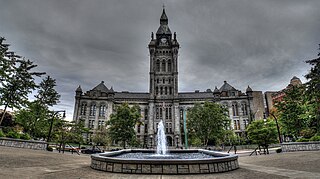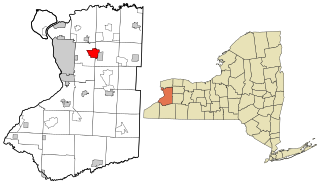
Erie County is a county along the shore of Lake Erie in western New York State. As of the 2020 census, the population was 954,236. The county seat is Buffalo, which makes up about 28% of the county's population. Both the county and Lake Erie were named for the regional Iroquoian language-speaking Erie tribe of Native Americans, who lived in the area before 1654. They were later pushed out by the more powerful Iroquoian nations tribes. The county is part of the Western New York region of the state.

Depew is a village in Erie County, New York. The population was 15,303 at the time of the 2010 census. It is part of the Buffalo–Niagara Falls metropolitan area. The village is named for Chauncey Depew, a politician and one of the original investors who bought the land for the village, which was incorporated in 1894.

William Edward Miller was an American politician who served in the United States House of Representatives from New York as a Republican. During the 1964 presidential election, he was the Republican nominee for vice president, the first Catholic nominated for the office by the Republican Party.

Daniel Manning was an American journalist, banker, and politician. A Democrat, he was most notable for his service as the 37th United States Secretary of the Treasury from 1885 to 1887 under President Grover Cleveland.

Warner Miller was an American businessman and politician from Herkimer, New York. A Republican, he was most notable for his service as a U.S. Representative (1879-1881) and United States Senator (1881-1887).

Chester Charles Gorski was an American politician from Buffalo, New York. A Democrat, he served one term in the United States House of Representatives from 1949 to 1951, and was the longtime president of the Buffalo Common Council.
Steven Pankow was an American businessman and politician. A Democrat, he was most notable for his service as mayor of Buffalo, New York from 1954 to 1957.

William Caryl Ely was an American lawyer and politician from New York.

Arthur Schoellkopf was an American industrial leader who helped develop the hydroelectric resources of Niagara Falls and served as the fifth Mayor of Niagara Falls, New York.
William Ellison Mills was an American leather manufacturer and politician from New York.
Emory P. Close was an American lawyer from New York.
Daniel Hugh McMillan was an American lawyer, politician, and judge.
William MacRae Nicoll was a Scottish-American lawyer, politician, and judge from New York.

Frank Haak Lattin was an American physician, naturalist, and politician from New York.
Frank Stuart Hall was an American farmer and politician from New York.
Wallace Ray Austin was an American pharmacist and politician from New York.
Henry Greenebaum was a German-born Jewish-American banker.
Francis Griswold Landon was an American soldier and politician from New York.
Simon Peter Quick was an American lumberman, hotelier, and politician from New York.
William Barlow Dunlap was an American lawyer, politician, and judge from Amsterdam, New York.









